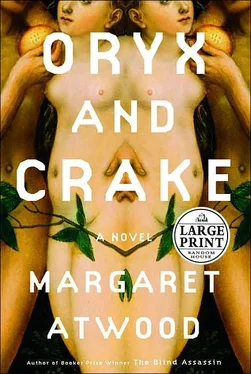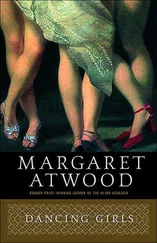Double-entry on-screen bookkeeping, banking by fingertip, using a microwave without nuking your egg, filling out housing applications for this or that Module and job applications for this or that Compound, family heredity research, negotiating your own marriage-and-divorce contracts, wise genetic match-mating, the proper use of condoms to avoid sexually transmitted bioforms: those had been the Life Skills. None of the kids had paid much attention. They either knew it already or didn’t want to. They’d treated the class as a rest hour. We are not here to play, to dream, to drift. We are here to practise Life Skills.
“Whatever,” says Snowman.
Or, instead of chess or a journal, he could focus on his living conditions. There’s room for improvement in that department, a lot of room. More food sources, for one thing. Why didn’t he ever bone up on roots and berries and pointed-stick traps for skewering small game, and how to eat snakes? Why had he wasted his time?
Oh honey, don’t beat yourself up! breathes a female voice, regretfully, in his ear.
If only he could find a cave, a nice cave with a high ceiling and good ventilation and maybe some running water, he’d be better off. True, there’s a stream with fresh water a quarter of a mile away; at one place it widens into a pool. Initially he’d gone there to cool off, but the Crakers might be splashing around in it or resting on the banks, and the kids would pester him to go swimming, and he didn’t like being seen by them without his sheet. Compared to them he is just too weird; they make him feel deformed. If not people, there might well be animals: wolvogs, pigoons, bobkittens. Watering holes attract carnivores. They lie in wait. They slaver. They pounce. Not very cozy.
The clouds are building, the sky darkening. He can’t see much through the trees but he senses the change in light. He slides off into half-sleep and dreams of Oryx, floating on her back in a swimming pool, wearing an outfit that appears to be made of delicate white tissue-paper petals. They spread out around her, expanding and contracting like the valves of a jellyfish. The pool is painted a vibrant pink. She smiles up at him and moves her arms gently to keep afloat, and he knows they are both in great danger. Then there’s a hollow booming sound, like the door of a great vault shutting.
He awakes to thunder and a sudden wind: the afternoon storm is upon him. He scrambles to his feet, grabs his sheet. Those howlers can come on very fast, and a metal bed frame in a thunderstorm is no place to be. He’s built himself an island of car tires back in the woods; it’s simply a matter of crouching on them, keeping their insulation between himself and the ground until the storm is over. Sometimes there are hailstones as big as golf balls, but the forest canopy slows their fall.
He reaches the pile of tires just as the storm breaks. Today it’s only rain, the usual deluge, so heavy the impact turns the air to mist. Water sluices down onto him as the lightning sizzles. Branches thrash around overhead, rivulets amble along the ground. Already it’s cooling down; the scent of freshly washed leaves and wet earth fills the air.
Once the rain has slowed to a drizzle and the rumbles of thunder have receded, he slogs back to his cement-slab cache to collect the empty beer bottles. Then he makes his way to a jagged concrete overhang that was once part of a bridge. Beneath it there’s a triangular orange sign with the black silhouette of a man shovelling. Men at Work, that used to mean. Strange to think of the endless labour, the digging, the hammering, the carving, the lifting, the drilling, day by day, year by year, century by century; and now the endless crumbling that must be going on everywhere. Sandcastles in the wind.
Runoff is pouring through a hole in the side of the concrete. He stands under it with his mouth open, gulping water full of grit and twigs and other things he doesn’t want to think about—the water must have found a channel through derelict houses and pungent cellars and clotted-up ditches and who knows what else. Then he rinses himself off, wrings out his sheet. He doesn’t get himself very clean this way, but at least he can shed the surface layer of grime and scum. It would be useful to have a bar of soap: he keeps forgetting to pick one up during his pilfering excursions.
Lastly he fills up the beer bottles. He should get himself a better vessel, a Thermos or a pail—something that would hold more. Also the bottles are awkward: they’re slippery and hard to position. He keeps imagining he can still smell beer inside them, though it’s only wishful thinking. Let’s pretend this is beer.
He shouldn’t have brought that up. He shouldn’t torture himself. He shouldn’t dangle impossibilities in front of himself, as if he were some caged, wired-up lab animal, trapped into performing futile and perverse experiments on his own brain.
Get me out! he hears himself thinking. But he isn’t locked up, he’s not in prison. What could be more out than where he is?
“I didn’t do it on purpose,” he says, in the snivelling child’s voice he reverts to in this mood. “Things happened, I had no idea, it was out of my control! What could I have done? Just someone, anyone, listen to me please!”
What a bad performance. Even he isn’t convinced by it. But now he’s weeping again.
It is important , says the book in his head, to ignore minor irritants, to avoid pointless repinings, and to turn one’s mental energies to immediate realiti es and to the tasks at hand. He must have read that somewhere. Surely his own mind would never have come up with pointless repinings , not all by itself.
He wipes his face on a corner of the sheet. “Pointless repinings,” he says out loud. As often, he feels he has a listener: someone unseen, hidden behind the screen of leaves, watching him slyly.
He does have a listener: it’s a rakunk, a young one. He can see it now, its bright eyes peering out at him from under a bush.
“Here girl, here girl,” he says to it coaxingly. It backs away into the underbrush. If he worked at it, if he really tried, he could probably tame one of those, and then he’d have someone to talk to. Someone to talk to was nice, Oryx used to tell him. “You should try it sometime, Jimmy,” she’d say, kissing him on the ear.
“But I talk to you,” he’d protest.
Another kiss. “Do you?”
When Jimmy was ten he’d been given a pet rakunk, by his father.
What did his father look like? Snowman can’t get a fix on it. Jimmy’s mother persists as a clear image, full colour, with a glossy white paper frame around her like a Polaroid, but he can recall his father only in details: the Adam’s apple going up and down when he swallowed, the ears backlit against the kitchen window, the left hand lying on the table, cut off by the shirt cuff. His father is a sort of pastiche. Maybe Jimmy could never get far enough away from him to see all the parts at once.
The occasion for the gift of the rakunk must have been his birthday. He’s repressed his birthdays: they weren’t a matter for general celebration, not after Dolores the live-in Philippina left. When she was there, she’d always remember his birthday; she’d make a cake, or maybe she’d buy one, but anyway there it would be, a genuine cake, with icing and candles—isn’t that true? He clutches on to the reality of those cakes; he closes his eyes, conjures them up, hovering all in a row, their candles alight, giving off their sweet, comforting scent of vanilla, like Dolores herself.
His mother on the other hand could never seem to recall how old Jimmy was or what day he was born. He’d have to remind her, at breakfast; then she’d snap out of her trance and buy him some mortifying present—pyjamas for little kids with kangaroos or bears on them, a disk nobody under forty would ever listen to, underwear ornamented with whales—and tape it up in tissue paper and dump it on him at the dinner table, smiling her increasingly weird smile, as if someone had yelled Smile! and goosed her with a fork.
Читать дальше












